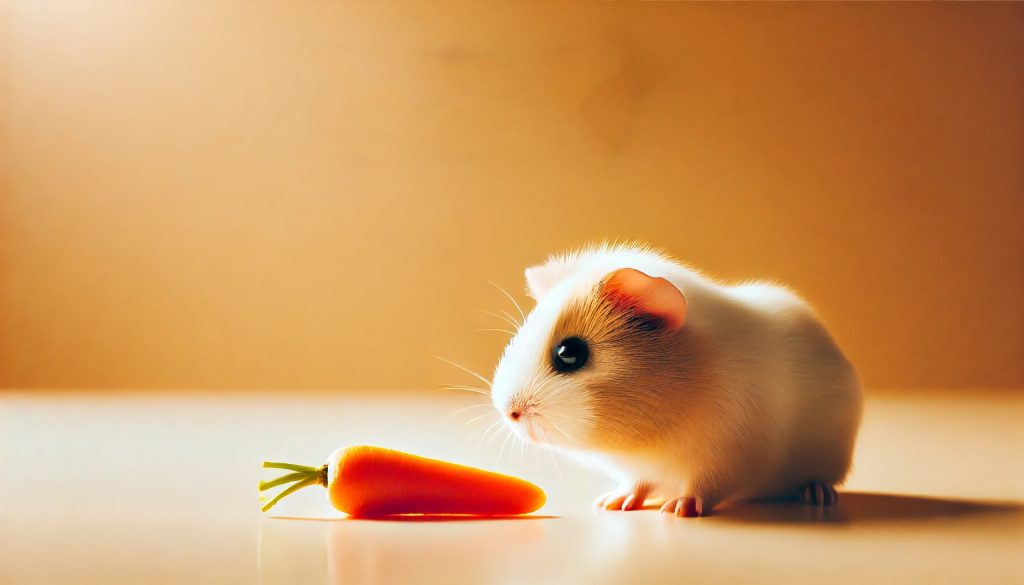
Can Guinea Pigs Eat Carrots?
The Importance of Diet for Guinea Pigs
Providing a balanced diet is crucial for maintaining your guinea pig’s health. Their daily food intake should meet their nutritional needs to ensure they stay active and healthy.
Understanding Nutritional Needs
Guinea pigs require a diet rich in vitamin C, fiber, and fresh produce. They cannot produce vitamin C naturally, so incorporating it into their meals are essential. Pellets formulated specifically for guinea pigs, hay, and fresh vegetables like carrots can help meet these needs. Avoid foods high in calcium, sugars, and fats as they can lead to health issues.
Common Foods for Guinea Pigs
Guinea pigs thrive on a variety of foods. Here are some common options:
- Hay: Timothy hay provides necessary fiber and keeps their digestive system healthy.
- Pellets: Specifically formulated pellets ensure they get balanced nutrients.
- Vegetables: Carrots, bell peppers, and leafy greens offer vitamins and minerals. Offer them in moderation to prevent overconsumption of certain nutrients.
- Fruits: Apples and strawberries can be occasional treats but are high in sugars, so limit their intake.
Proper diet management contributes to your guinea pig’s longevity and reduces the risk of dietary-related illnesses.
Can Guinea Pigs Eat Carrots?
Guinea pigs can eat carrots, but understanding their impact on health is essential. Carrots offer numerous nutritional benefits while also posing some risks if not monitored.
Nutritional Benefits of Carrots
Carrots provide several key nutrients beneficial to guinea pigs:
- Vitamin A (Beta-Carotene): Supports eye health and immune function.
- Vitamin C: Essential for guinea pigs as they can’t produce it themselves.
- Dietary Fiber: Aids digestion and promotes a healthy gut.
- Antioxidants: Help combat oxidative stress, maintaining overall health.
- High Sugar Content: May contribute to obesity and diabetes if given in excess. Limit carrot treats to a few small pieces a week.
- Calcium Oxalates: Can contribute to bladder stones. Introduce carrots gradually and watch for any discomfort or changes in behavior.
- Balanced Diet Importance: Ensure carrots don’t replace other essential foods like hay, pellets, and leafy greens. Balance is crucial for avoiding nutrient imbalances and over-reliance on one type of food.
Serving Carrots to Guinea Pigs
Guinea pigs benefit from carrots’ vitamins but need careful portion control to avoid health risks. Proper preparation and serving sizes ensure they enjoy this treat safely.
How To Prepare Carrots
Wash carrots thoroughly to remove any pesticides. Peel if preferred but it’s not necessary. Cut carrots into small, bite-sized pieces to make them easy for guinea pigs to eat and reduce choking hazards. Serve raw; cooking reduces their nutritional value. Organic carrots, when available, are ideal to minimize exposure to chemicals.
Recommended Serving Sizes
Limit carrots to 1-2 small pieces per guinea pig, 2-3 times per week to prevent health issues from excess sugar and calcium. Balance carrot treats with hay, fresh pellets, and leafy greens. Adjust portion size based on your guinea pig’s individual tolerance and dietary needs. Too many carrots can lead to nutritional imbalances, so moderation is key.
Other Healthy Treats for Guinea Pigs
Carrots aren’t the only treat your guinea pigs can enjoy. Offering a variety of other healthy treats ensures they get a balanced diet and remain happy.
Safe Vegetables and Fruits
Include a mix of veggies and fruits to maintain nutritional balance. Some safe vegetables for guinea pigs include:
- Bell Peppers: Low in sugar, high in Vitamin C.
- Cucumbers: Hydrating, low in calories.
- Zucchini: Good source of Vitamin C and potassium.
- Leafy Greens: Romaine lettuce, cilantro, and parsley.
Fruits are best given in moderation due to sugar content. Safe fruits include:
- Apples: Remove seeds, rich in Vitamin C.
- Blueberries: Antioxidants, limited to 1-2 times a week.
- Strawberries: Vitamin C, should be given sparingly.
- Oranges: High in Vitamin C, small pieces occasionally.
Foods to Avoid
Certain foods can harm your guinea pig’s health. Avoid the following:
- Chocolate: Toxic and dangerous.
- Avocado: Contains persin, harmful even in small quantities.
- Onions and Garlic: Can cause digestive issues and be toxic.
- Iceberg Lettuce: Low nutrients, can cause diarrhea.
- Rhubarb: Toxic substance oxalic acid.
Providing a variety of safe vegetables and fruits while avoiding harmful foods ensures your guinea pig stays healthy and thrives.
Conclusion
Feeding your guinea pig carrots can be a delightful treat if done in moderation. While carrots offer valuable nutrients like Vitamin A and Vitamin C, their high sugar content means they shouldn’t be a daily snack. Balance their diet with hay, pellets, and a variety of safe vegetables and fruits to ensure they get the nutrition they need.
Always be cautious about foods that are harmful to guinea pigs, such as chocolate, avocado, and onions. By providing a diverse and safe diet, you’re setting the foundation for a happy and healthy guinea pig.
